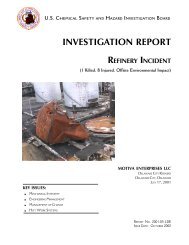Little General Store Propane Explosion - US Chemical Safety and ...
Little General Store Propane Explosion - US Chemical Safety and ...
Little General Store Propane Explosion - US Chemical Safety and ...
Create successful ePaper yourself
Turn your PDF publications into a flip-book with our unique Google optimized e-Paper software.
<strong>Little</strong> <strong>General</strong> <strong>Store</strong> September 2008<br />
Key Findings<br />
1. The propane service technicians, emergency responders, <strong>and</strong> store employees did not evacuate the<br />
area as recommended by nationally accepted guidance for propane emergencies.<br />
2. A defect in the existing tank’s liquid withdrawal valve caused it to malfunction <strong>and</strong> remain in an open<br />
position.<br />
3. The junior propane service technician who was servicing the tank on the day of the incident had no<br />
formal training <strong>and</strong> did not recognize the defect in the withdrawal valve. He was also working<br />
unsupervised, even though he had been on the job for only one <strong>and</strong> a half months.<br />
4. The placement of the 500-gallon propane tank against the building’s exterior back wall provided<br />
releasing propane a direct path into the store’s interior.<br />
5. The Occupational <strong>Safety</strong> <strong>and</strong> Health Administration’s <strong>and</strong> National Fire Protection Association’s<br />
propane st<strong>and</strong>ards require training but do not include curricula, practical exercises, or knowledge<br />
evaluation.<br />
6. 911 operators in the United States lack propane emergency guidance to help them collect important<br />
information from callers, offer life-saving advice, <strong>and</strong> convey relevant information to first responders.<br />
7. Firefighters in West Virginia are required to attend a minimum of four hours of hazardous materials<br />
emergency response training as part of their initial training sequence, but refresher training is not<br />
required. The responding Ghent Volunteer Fire Department captain last attended a hazardous<br />
materials response course in 1998.<br />
8. <strong>Propane</strong> safety <strong>and</strong> emergency training is voluntary for fire department personnel in West Virginia.<br />
None of the responders from the Ghent Volunteer Fire Department had specific propane emergency<br />
training.<br />
3









